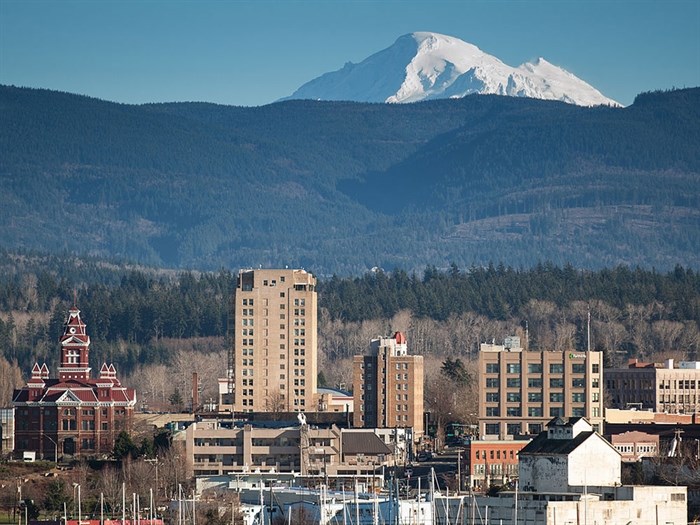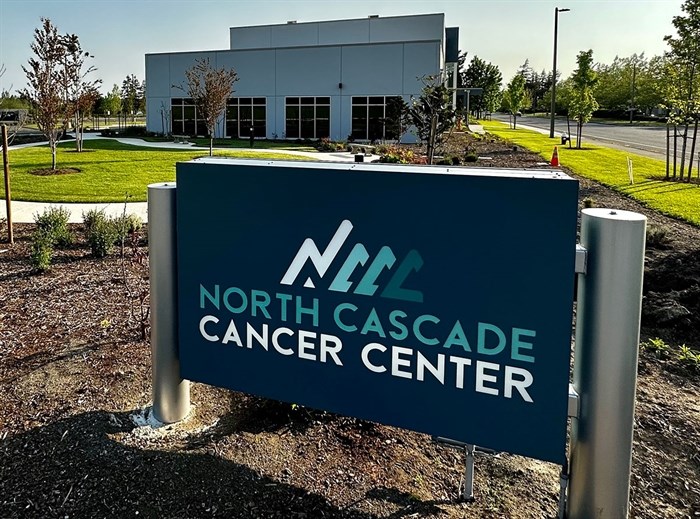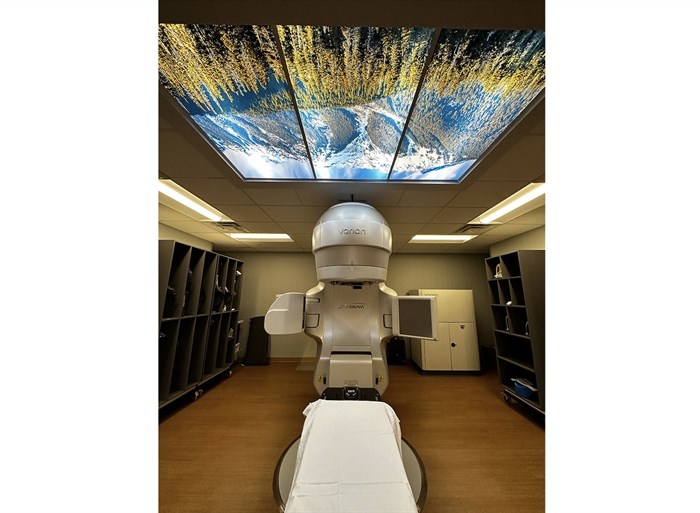
Bellingham, Washington, is an hour-and-a-half drive from Vancouver. Some BC cancer patients are now being sent there to receive treatment under a new provincial program designed to address backlogs.
Image Credit: WIKIMEDIA COMMONS/Nick Kelly/Faithlife Corp.
June 30, 2023 - 11:36 AM
The first few breast cancer and prostate cancer patients started travelling from their homes in British Columbia to receive radiation therapy at two clinics in Bellingham, Washington, this spring. They are part of a provincial government response to a growing backlog of cancer treatment. The province announced its plan to send patients to Washington state for cancer care last month.
As of June 13, the B.C. Ministry of Health told The Tyee that two patients have started receiving treatment at the private, non-profit PeaceHealth St. Joseph Cancer Center and the private North Cascade Cancer Center in Bellingham. Nine have had a consult with an American radiation oncologist. In total, 87 patients in B.C. have been referred by the province to American clinics so far, 38 of whom have accepted the referral and made travel plans.
“As you can appreciate, we are currently in the infancy stages of this program,” B.C. Health Minister Adrian Dix wrote in an emailed response to questions from The Tyee.
“Patients with shorter treatment courses, typically around five days, will be offered the opportunity for treatment [in the U.S.],” Dix wrote. “Some patients choose to continue care in B.C., or were not eligible to travel, or have a companion who was not eligible to travel.”
Interview requests to multiple oncologists with BC Cancer, meanwhile, were not answered by press time. And the Health Ministry has asked U.S. doctors to refrain from sharing information about the program with journalists.
“We did get a request from the Health Ministry of B.C. not to get into the details of things,” said Dr. Alexei Polishchuk, a radiation oncologist at the North Cascade centre. “We’ve been asked to direct media inquiries to the provincial health authorities.”
Similarly, a representative from PeaceHealth St. Joseph declined to answer questions about their agreement with B.C., instead stating they “prefer to have the spokespeople for BC Cancer take the lead on responding,” in an emailed response to The Tyee.
Over the past few weeks, The Tyee has asked questions of multiple people who have a stake in B.C.’s health and cancer care system, from doctors and patients to researchers and clinics.
The consensus is that while the plan to offload one part of cancer care for breast and prostate cancer patients is a helpful, necessary step to alleviate growing wait times for radiation therapy, it’s disappointing because it doesn’t go far enough to address gaps and shortages in diagnosis and treatment.
Though the ministry covers all expenses for treatment, travel and a companion to accompany a patient while they receive cancer care in the U.S., eligibility limitations and patients’ own requirements create some complexity in who can make use of the program so far.
The province initially estimated that under this new initiative, up to 50 B.C. cancer patients could receive care in Washington state each week over the next two years. At that rate, roughly 2,400 British Columbians with cancer could receive care south of the border per year.
It’s an effort to address a provincewide demand for cancer care that is only projected to grow. This year, 33,105 people in B.C. are expected to receive a new cancer diagnosis. That number is expected to go up to 38,770 by 2029.
According to the B.C. Health Ministry, the median wait time for radiation therapy in B.C. is 17 days as of May 24. They also noted that wait times vary by cancer centre, region and disease type.
Meanwhile in these early days of B.C. cancer patients being sent to Washington to address treatment backlogs, a complicated picture of care is emerging. It raises questions about how effective this initiative will be.

The North Cascade Cancer Center in Bellingham, Washington. The for-profit cancer centre is where some BC cancer patients have been sent for treatment under a new provincial initiative aimed at reducing backlogs in care.
Image Credit: SUBMITTED/Dr. Alexei Polishchuk
A treatment option, but not a solution
In the three weeks since the Health Ministry announced plans to refer B.C. residents for cancer care in Washington state, no one from BC Cancer has reached out to Amber, a terminal breast cancer patient in Vancouver, to inform her of new treatment options. Amber is using a pseudonym to protect her privacy.
She requested to remain unnamed for two reasons: as a gig worker she does not speak publicly about her terminal cancer diagnosis for fear of losing work; and with BC Cancer as her only choice for treatment, she fears repercussions in her care if named.
“I went for three mammograms in my early 40s before the province changed the directive,” Amber told The Tyee in a phone interview. “I stopped based on my family doctor telling me to, and then at 48 I discovered a lump and it was already stage three.” She is now 54 years old.
At the moment BC Cancer recommends people get screened for breast cancer at 40 if they have a “first-degree relative” (mother, daughter or sister) with breast cancer. The current recommendation is people aged 50 to 74 without a family history of breast cancer get a mammogram every two years.
After a double mastectomy and the maximum amount of radiation therapy possible in 2018, Amber’s cancer returned three years later. She now has tumours in her neck, lungs, liver, spine and brain, and needs radiation for pain management.
“If you treat breast cancer in an early stage, it’s basically a 100 per cent chance that you’ll be fine,” she said. “The more advanced it gets, the harder it becomes.”
Amber joined some oncologists across Canada in calling for the country to recommend breast cancer screening start at age 40, following the U.S.’s lead.
If Amber had been offered a chance to go to the U.S. for any part of her radiation treatment, she would have declined for multiple reasons. And those are not unique to her situation.
For one thing, Amber had let her passport lapse during the pandemic, when travel was limited and renewing it was not a priority, so she would not be eligible to travel. Secondly, there is no one to accompany Amber to Washington.
“Many cancer patients find that they lose all their friends when they’re diagnosed because people don’t know how to deal with death…. A lot of online cancer patient support groups that I follow all talk about the same thing: how people disappear from their lives,” she said.
“It is really hard at first when it happens, but it’s just part of it.”
‘They know there’s this need they can’t meet’
The highly specific types of radiation therapies being addressed by B.C.’s plan to send some patients for treatment in Washington state is one piece of the diagnosis and treatment puzzle.
Doctors, patients and those who work with cancer patients — researchers, support group leaders and ultrasound specialists — are calling attention to a number of other pieces that need addressing.
“Medical oncology has had excessively long wait times. Particularly for GI [gastrointestinal] cancer, so colon cancer, for example, and breast cancer,” said Dr. Jennifer Lush, a family doctor in Victoria. “The medical oncologists are very stressed because they know that there’s this need they can’t meet.”
Dr. Lush has patients who were told they should get immunotherapy for colon cancer within four weeks, but ended up having to wait four months or longer. She has also had a breast cancer patient who should have started hormone therapy within a couple of months of diagnosis, but had yet to see a medical oncologist nine months later.
There is hope on the horizon that this shortage of medical oncologists in Victoria will soon be addressed, with the addition of two or three more specialists expected in the late summer and fall, Dr. Lush said.
Amber also drew attention to a shortage of tertiary services. For example, she needs an MRI every three months to monitor her tumours, but the last scan was months late.
A shortage of family doctors, who are needed to treat side effects of cancer treatments and screen for other problems — like Amber’s arthritis, annual colon cancer screening, and prescription medications to deal with other side effects — is also a problem.
Leah Lariviere, the executive director of Prostate Cancer Foundation BC, which offers emotional support services for patients, said they have been hearing more and more from patients who don’t have a family physician.
“We’re not able to see a doctor,” “We can only do it virtually,” “How can [they] diagnose me with this if it’s only a [virtual visit]?” are some of the complaints they’ve been hearing, she said.

Inside a treatment room at North Cascade Cancer Treatment Center.
Image Credit: SUBMITTED/Dr. Alexei Polishchuk
‘Why would we think they have extra capacity?’
These problems won’t be solved by the province’s plan to open new cancer centres in Kamloops, Nanaimo, Surrey and Burnaby, said Dr. Lush. “Why build more expensive buildings that are going to sit empty?” she asked. “If you take some of the people that would have worked in Victoria and you move them up to Nanaimo, you’re not servicing either community well.”
This was echoed by Dr. Sanjiv Gandhi, a pediatric cardiothoracic surgeon and former chief of cardiac surgery at BC Children’s Hospital who quit at the end of 2022 to become the BC Green Party’s second deputy leader.
The model for health care provision in the U.S. is different than in Canada which means due diligence is required to make sure patients get the best care, Dr. Gandhi notes.
“Having worked in the United States for 17 years, it’s not a thing to say ‘no’ to patients when you’re a private hospital,” he said. “You always say ‘yes,’ because it’s a for-profit business south of the border.... You can get the best treatment in the best centres, but every centre doesn’t offer the best treatment.”
Both Dr. Gandhi and Dr. Michael Cox, a senior researcher at the Vancouver Prostate Centre and associate professor at UBC, wondered how and why B.C. selected the two for-profit Bellingham clinics in Washington.
“Why would we think that [Bellingham clinics] have extra capacity?” Dr. Cox asked. “I have colleagues all over the world and none of them said, ‘We’ve got so much extra capacity here.’”
Bellingham’s North Cascade Cancer Center, which opened in April 2022, currently sees up to 35 patients a day, according to Dr. Polishchuk. A representative from PeaceHealth St. Joseph said their patient load varies depending on treatment cycles. Both said they are happy to accept B.C. patients.
“We currently provide radiation oncology treatments and in the summer, we’re going to be adding medical oncology treatment, primarily for now aimed at U.S. patients,” Dr. Polishchuk said.
The B.C. Ministry of Health did not answer The Tyee’s questions about how they selected the two cancer centres in Bellingham.
While governments and health organizations grapple with solutions for the future of cancer care, patients like Amber keep moving through their daily lives, noticing how cancer has altered them and their connections to meaningful communities and support networks.
“I think there’s a perception that cancer patients have all these people around them supporting them,” she said.
News from © iNFOnews, 2023